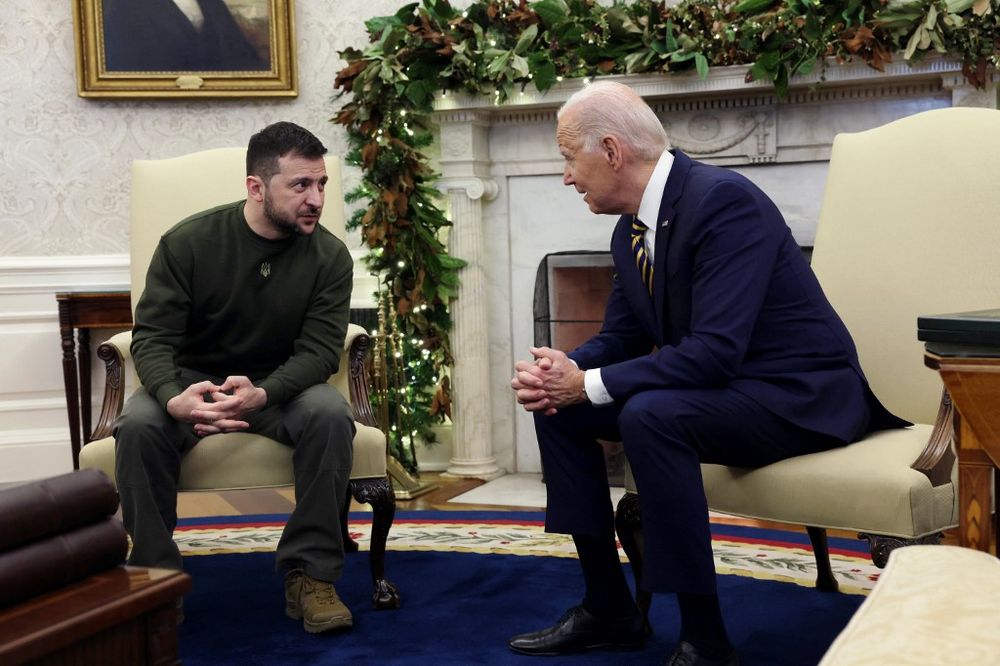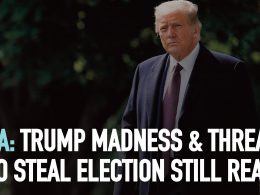U.S. Secretly Prepares to Accept Russian Annexation of Ukrainian Regions
By Walter Chambers, International Socialist Alternative
As a further stage in the New Cold War opens up with the threat of new war in Africa after the coup in Niger, new information is emerging about the behind the scenes activities by the imperialist powers over Ukraine.
In early July NBC News reported that secret “Track 2.0” talks with Russia have been taking place. This was followed on 26 July by an article in The Moscow Times which reported that in addition “Track 1.5” diplomacy has been taking place.
“Track 2.0” and “Track 1.5” talks are often held to investigate the position of different sides during conflict situations. The first are conducted by unofficial experts, in this case former senior U.S. National Security officials, with the aim of preparing the groundwork for negotiations. “Track 1.5” diplomacy is a step up usually involving at least current officials from one side — reportedly Sergey Lavrov, Russia’s Foreign Minister. They have taken place, according to these reports, “with the knowledge” of the Biden administration and their results have been reported to the National Security Council.
Such diplomatic processes are usually described as part of “conflict resolution”, supposedly to investigate what red lines each side is not prepared to cross, and find common ground on which agreement can be built. But in reality they are used to deprive the masses of any possibility of participating in decisions over their future. This happened, for example, at the end of the first Intifada, a prolonged mass uprising by Palestinians against the Israeli occupation. As it became clear that the situation had become untenable, back-door diplomacy starting with ‘Track 2.0’ was conducted in secret and preceded the Oslo Accord of 1993 between Israel and the P.L.O. The interests of the Palestinian masses were ignored, and rather than solving any problems, the agreement created additional new problems.
The NBC report contained very little detail about what had been discussed in the talks with Russian representatives. But the Moscow Times, based on interviews with a high-ranking participant speaking anonymously, revealed how far the US is prepared to go to accommodate Putin at the expense of Zelensky’s declared objectives if and when negotiations become possible.
The official said that though Putin himself was the main obstacle to negotiations, the Russian side doesn’t “know how to define victory or defeat. In fact, some of the elites to whom we spoke never wanted war in the first place, even saying it had been a complete mistake.” Despite this, for them accepting defeat is not an option. He warned that “an attempt to isolate and cripple Russia to the point of humiliation or collapse would make negotiating almost impossible… a total victory in Europe could harm our interests in other areas of the world”. “Russian power” he added “is not necessarily a bad thing”.
Significantly, the “Track 1.5” talks went further than investigating possible common ground, but included offers by the US side to cooperate with the Russian dictatorship. An offer was made by the US negotiators to facilitate new referendums in the Russian occupied regions of Ukraine. As they are now under military rule and much of the population has fled, in effect this “offer” will de-facto allow Russia to legalise the annexation of significant parts of Ukraine.
F16s only serving US Cold War interests
The dogged resistance to the Russian invasion is in large part due to the determination of Ukrainian troops backed by the population. That has been assisted by the large-scale delivery of weapons, crossing previously established red-lines, by the US and its allies. Although these weapons have played a key role, the US has still put restrictions on their use for fear the war could escalate into a direct confrontation involving NATO troops, and in particular to avoid pushing Putin to use nuclear weapons. For this reason, the US wants to prevent Ukraine from using western weapons to target Russia itself. After a Ukrainian naval drone seriously damaged a Russian oil tanker in the Kerch Strait, the US expressed its concern for fear it would trigger a new jump in oil prices.
While pressure is mounting to give the Ukrainian army access to Western aircraft, the process is very slow and, at the end of July, new information about the fate of the F16 fighters which President Biden had promised should be delivered by the end of the year appeared. Although the eleven nation “Fighter coalition” has pledged to train the Ukrainian pilots for these jets, “Politico.eu” reports that so far the partners have not yet agreed how the pilots will be trained, no country has agreed to supply training aircraft, and the US has so far not agreed to provide the necessary training materials and flight simulators. Even when training commences, six months are needed for the pilots to become competent.
But now the US is even putting into doubt whether F16 aircraft will be available. The initial US declaration that it would not block the re-export of its fighter jets to Ukraine suggested that between them Denmark and the Netherlands would supply up to 45 aircraft. On 26 July, however, the “Buenos Aires Times” reported that the White House is now pressurising Denmark to send over half of these aircraft to Argentina. It fears that Argentina, which has been strengthening its relationship with China, is about to purchase aircraft made jointly by Pakistan and China.
On top of this President Biden, according to the Financial Times, in an effort to keep Republican support for increased military spending is proposing to divert part of the money allocated to support Ukraine to help Taiwan purchase weapons.
Ukraine disappointed by NATO summit.
While the NATO summit in Vilnius in July lifted the process of integration and the co-option of the Ukrainian state into the so-called Western camp to the next level, this did not happen without painful accusations, pressure from all sides and disappointments. Behind the warm diplospeak of the official NATO post-summit press release, which reported a “multi-year assistance programme” to convert the Ukrainian armed forces from Soviet-era to NATO standards and the new “NATO-Ukraine Council”, huge frustrations were expressed on both sides. Zelensky was furious at the refusal to agree a timetable for Ukraine to join NATO, and even considered refusing to attend the summit. He was also angered that membership would be used as a bargaining tool for use in negotiations with Russia.
In turn, even Ukraine’s firmest supporters expressed their growing dismay at Zelensky. UK Defence Secretary Ben Wallace turned on him for continuously presenting a shopping list of weapons needed saying “You know we are not Amazon”. Wallace reported increasing grumbles from US lawmakers about the $43 billion worth of military aid without the suitable gratitude expressed by Zelensky. A diplomatic spat has now broken out between Warsaw and Kyiv after the former complained of Kyiv’s “lack of gratitude”.
Russia and Ukraine have both used cluster bombs in the earlier 2014–5 conflict and in 2022, even though many countries ban the use of these brutal weapons which cause many civilian deaths. The decision by the US to provide more of these weapons made the headlines, but hides the growing reluctance of countries to increase support. The latest report (06.07.2023) from the Kiel Institute for the World Economy says that “despite the Ukrainian offensive, new pledges are not as large as at the beginning of the year, and military equipment deliveries are well below commitments”. In the fifth quarter since the start of the war, promised aid increased by $13billion ($9 billion military aid) taking the total of commitments to $165 billion. This may be boosted by the new package currently being pushed by Biden.
Zelensky’s view of the future
This ‘aid’, including the loans and grants given by bodies such as the World Bank and European Union costs the Ukrainian working class dearly. The EU has granted a 35-year interest-free loan, but will every year monitor Ukraine’s progress in implementing a 20-point reform programme, including increasing consumer energy prices. If Ukraine does not comply, it will have to pay interest. Even though Ukraine paid back $2.4 billion to close an IMF loan in 2022, the same institution only agreed new loans worth $2.7 billion tied to new structural benchmarks which include budget stability.
Despite this, the Zelensky government has been offering more and more incentives to big business. Speaking to the Financial Times, Ukrainian defence minister Oleksiy Reznikov promised the global arms industry: “you can’t invent a better testing ground”. Manufacturers “can actually see if their weapons work, how efficiently they work and if they need to be upgraded”. At the recent Ukraine Recovery Conference held in London, Zelensky addressed big business: “When we are talking about recovery, we are talking about millions of jobs, billions in corporate profits and trillions of GDPs. And not only for Ukraine, but for all our countries — mine and yours”.
Zelensky now realizes Ukraine will not be allowed to join NATO for years to come. As he said in April: “If we are offered to join NATO tomorrow, if they don’t play with our lives again, but seriously offer, we will join. But this will not happen, unfortunately, and did not happen.” Instead, he has turned his attention to gaining security guarantees. “We cannot talk about ”Switzerland of the future… But we will definitely become a “big Israel” with its own face. We will not be surprised that we will have representatives of the Armed Forces or the National Guard in all institutions, supermarkets, cinemas, there will be people with weapons. I am sure that our security issue will be number one in the next ten years.”
Pressure for negotiated settlement steps up
Maria Zakharova, spokesperson for the Russian Foreign Ministry claims there have been over 30 proposed peace initiatives from various sources. At the present time, at least until the results of Ukraine’s counter offensive become clear, there is no realistic possibility for serious negotiations to start.
In part this is due to the intransigence of Putin who, despite public statements in support of negotiations, so far shows no signs of agreeing to any serious concessions. Zelensky too, with the overwhelming support of the Ukrainian population, insists that there should be no negotiations without Ukraine’s participation, and that the first condition is the complete withdrawal of all Russian troops from all Ukrainian territory. He did, however say, in his April statement that “repelling the full-scale war to the point where it began on February 24, 2022 is definitely a victory for us.”
Whether or not negotiations take place at a certain stage depends not just on the outcome of the current Ukrainian offensive. If unsuccessful, increasing the prospect of a long drawn-out war, the western imperialist backers could grow more reluctant to continue their support. The possibility that Trumpism may win next year’s election could increase pressure to cut expenditure. If the offensive is successful, it could stimulate support from the west, but also provoke further crises within the Russian regime, raising the threat of its complete break-up. China then would face a choice — allow the collapse of Russia with all the consequent chaos that it will provoke, depriving it of a key partner in the developing cold war or step in by pressuring Russia to retreat before the disaster becomes so great its key partnership with Russia becomes rather a burden than an asset.
Amongst these peace initiatives, Indonesia in June called for a ceasefire, a demilitarised zone between the sides and UN sponsored referendums in those areas seized by Russia. President Lula of Brazil, condemning Russia for invading Ukraine and the west for arming Ukraine thus prolonging the war, called for ‘neutral countries’ to negotiate a deal. The Pope has condemned Russian war crimes, demanding an immediate ceasefire with respect for Ukrainian sovereignty. He reflected the Catholic Church’s reorientation towards the Global South by suggesting NATO provoked Russia. African States led by South African President Ramaphosa called for a de-escalation of fighting based on recognising the sovereignty of both Russia and Ukraine, and the continuation of the grain deal. These plans all echo, in one way or another, the plan proposed by Xi Jinping during his visit to Moscow earlier this year.
The Chinese plan
The Chinese plan was quickly dismissed by the US as “just not rational”. The White House is not keen to see China seizing the initiative and positioning itself as peacemaker not just in Ukraine but in the eyes of many of those countries who have not fully supported the US position. It is widely and correctly perceived that the plan is intended more to get Russia out of a difficult situation than to genuinely aim for peace.
Nevertheless, it seems that the US may at a later stage turn to China for help in negotiations. This was expressed by US Secretary of State Antony Blinken recently. He pointed out that the strain between China’s support for Russia while presenting itself as neutral and a ‘peacemaker’ is increasingly apparent. He suggested that “Beijing’s ‘certain amount of influence’ with Moscow could be useful once diplomacy to end the war has realistic prospects of achieving results.”
These tensions within the Chinese regime were revealed by China’s Ambassador to France Lu Shaye, the notorious “wolf-warrior”, who in April suggested former Soviet states had no right to sovereignty. Beijing quickly disowned him, stressing its support for the sovereignty of states. No denials followed, however, when Fu Cong, China’s ambassador to the EU told the New York Times in April that China does not support Russia’s annexation of Crimea and Donbas. Later in Al Jazeera he called for negotiations and stated he “does not rule out Beijing’s support for Ukraine’s desire to restore its territorial integrity by returning to the borders of 1991.“ These statements are probably intended as a warning to the Kremlin not to abuse China’s support by overplaying its hand.
While many across the world, particularly from the working class and poor who are suffering from inflation, the food and climate crises worsened by the war would be relieved to see a ceasefire and some form of negotiated settlement, none of these plans can guarantee peace, or prevent new wars in the future. They all recognise in one form or another the forced annexation of parts of Ukraine by Russian imperialism, and will leave the rest of Ukraine tied to US imperialism, not as an equal, but subservient to it. Even if agreed by the Kyiv government, a significant part of the Ukrainian population will continue fighting to retake the annexed regions. Nor will they remove the dictatorial regime in Russia, on the contrary they need the current Russian leadership to remain in power, which it will do, licking its wounds, rebuilding its forces, ready to attack Ukraine again.
Zelensky’s “big Israel”
Zelensky now is promoting Ukraine’s own peace plan, which was discussed at the summit in authoritarian Saudi Arabia 5–6 August with the involvement of over 40 countries. These include Brazil, Egypt, South Africa, India, Turkey, UK, the EU and US. Although these talks were only planned as ‘exploratory’ particularly significant was the late agreement by China to send a representative. While it may be that it attended to avoid being sidelined in the global south if eventual negotiations take on form, the Financial Times described China’s presence as a “coup for Kyiv”. China’s constructive role in the talks, one EU diplomat explained, demonstrated it was “keen to show that [it] is not Russia… mere presence of China shows Russia is more and more isolated”. It was also noticeable that Ukrainian representatives did not insist on the complete withdrawal of all Russian troops as a precondition for talks.
There are other tensions between the aims of the different participants. The US is surely wanting to pressurise the non-committed countries to align themselves with NATO actions, while others, including it seems even Zelensky are looking at the summit to commit countries to supporting Ukraine’s objectives. In a meeting with Ukrainian diplomats on the eve of the summit Zelensky stated: “in the coming months the situation will become even more difficult as the western partners will demand of us that we sit at the table for peace negotiations with Moscow.” He expects this pressure to grow in the autumn.
The 10 points of Ukraine’s plan include the withdrawal of Russian troops, the restoration of territorial integrity, for those guilty of aggression to be tried by an international tribunal and for security guarantees for Ukraine. According to Zelensky’s office, discussion to develop these points continues, although the restoration of territorial integrity appears to be have been agreed. The most difficult discussion appears to have been over the tribunal for those guilty of aggression. The last point, the question of security guarantees is extremely problematic.
Previous security guarantees whether for Ukraine — the Budapest Agreement of 1994, the Minsk Agreement of 2014–5 — or elsewhere such as in the Balkans and Middle East have failed to end ethnic and national conflicts, and instead have assured their continuation. As Zelensky has stated with his talk of a “big Israel”, he wants something much more than the earlier agreements.
According to the misnamed “Carnegie Endowment for International Peace” (CEIP), such a Security guarantee would mean the rewriting of Ukrainian and international laws to ensure that no change of government could affect the outcome of the agreements. It would need a massive increase in financial support for Ukraine’s military. CEIP points out that Israel receives about $4 billion a year in military aid from the US. But Ukraine’s military is much older, and the country 4 times the size, so the cost would be much higher. In addition, a large increase in Western military expenditure to produce the armaments needed would be necessary. The normal democratic process would be bypassed by establishing a large military bureaucracy. Finally, CEIP suggests a Security guarantee would rely on EU support including membership. This would need pro-business reforms and the possibility, in CEIP’s words of “a European-led military mission aimed at facilitating Ukraine’s economic recovery and reconstruction” with a “Reconstruction Security Force [involving] troops from EU countries… deploying jointly with Ukrainian forces to special industrial zones designated by the government”.
This “big Israel” would not only be a highly militarised society, in which arms expenditure is prioritised at the expense of the restoration of the civilian infrastructure, of living standards and social programmes. It is obvious that workers and others who wish to stand up for their rights will face security forces protecting the interests of capital. It will face on the one side an angry revanchist Russian dictatorship, and on the other a highly militarised Eastern Europe.
Only the organised working class can provide the solution
Although Zelensky often says that there should be no negotiations about Ukraine’s future without the participation of Ukraine itself, the Western imperialists will easily propose an agreement without Ukraine’s support if it is in their interests. But while Zelensky is quite happy for workers and the poor to bear the burden of the military campaigns, and suffer the economic and social consequences of the war, he does not involve them in the decision making. This is not just because he doesn’t understand the need to do this, it is because he and his government are acting primarily in the interests of the Ukrainian capitalist class. His way out of the war is to create a “big Israel”, or if that doesn’t work make some agreement that leaves part of Ukraine annexed.
Genuine peace without annexation, protecting not just Ukrainian self-determination but the rights of languages and minorities within Ukraine will only be achieved when the workers and poor are organised across Ukraine including in Crimea, Russia and internationally, to reject the rule of the oligarchs and their imperialist backers not just in Ukraine, but able to overthrow the Russian dictatorship and its capitalist backers, taking over the running of society in their own interests.
ISA stands firmly on the side of the Ukrainian proletariat, and calls for international working class solidarity to help it defeat the brutal Russian occupation. This will only be possible by having absolutely no confidence in any of the imperialist forces, which is using the war to step up militarisation, preparing for future inter-imperialist conflicts, and which will clearly abandon Ukraine’s right to self-determination when that conflicts with its own interests. We can only rely on the independent political organization of the working class internationally.
There have already been huge initiatives taken by ordinary working people in Ukraine in developing intelligence gathering, adapting drones, repairing tanks, converting farm equipment for mine clearing, as well as all the support services such as medical aid, repairing the electricity network and so on. If a revolutionary organisation had existed from the beginning, it would have organised the workers’ movement in Ukraine and fought to take over the economic resources of the country to establish a real mass mobilisation against the invasion. Given the already disastrous situation with the state of the Russian forces, particularly after mobilisation, such a powerful example of genuine workers’ organisation would have allowed for a hugely convincing class appeal to the Russian troops and working class to end the war, and in turn to help overthrow the Russian regime.
We call for the building of a massive anti-war and anti-imperialist movement linking up workers and youth across the world. But it is not enough for this to be on simple ‘anti-imperialist’ and ‘anti-militarist’ demands. Simply calling for an end to the war either means accepting today’s status quo — accepting Russian imperialism’s annexation of parts of Ukraine or returning to the pre-24 February position. There should be a clear call for the withdrawal of all Russian troops from Ukraine, for the right of Ukraine to self-determination, and against all attempts by Western imperialism and other imperialist forces to exploit the Russian attack on Ukraine to further its own interests. Only by doing this can we prevent such “peace movements” being hijacked by pro-Russian apologists.
International capitalism has always found ways to by-pass international sanctions while ordinary working people suffer their consequences. That is why we oppose sanctions by one group of imperialists against another. But action taken by workers based on international solidarity is different. Despite bans on the export of technology, Russian companies continue to buy electronic components and other materials from European and US companies for arms manufacturing. Actions by trade unions to ‘black’ such trade and to expose how western companies continue to make super-profits using false flag ships to buy Russian oil could severely restrict the Russian army’s ability to obtain weapons for use against Ukraine. Such actions should be accompanied by attempts to link up with workers in Russia too, to encourage them to resist.
At the same time workers’ organisations should be campaigning to cancel all of Ukraine’s debts and to annul any conditions imposed on Ukraine by western institutions and to expropriate all the super profits made by energy, food and arms companies from the war to help not just those suffering from inflation, but to rebuild Ukraine. This means trying to build real links with workers’ organisations in Ukraine as they fight the labour laws, wage cuts and privatisation and to assist them directly with real material and humanitarian aid.
For the building of powerful, working-class based opposition uniting workers, youth, women and all oppressed groups against the ruling elite of the imperialist countries campaigning for:
- Russian troops out of Ukraine, peace without annexations, for the self-determination of Ukraine;
- For all Ukraine’s foreign debts and loans to be written off, for the rejection of all conditions imposed by the IMF, European Union, World Bank and other capitalist institutions to pay for imperialism’s support in the war;
- Against any increase in military expenditure, the expansion of NATO, for the dissolution of all military blocks and alliances;
- No confidence in negotiations conducted on behalf of Ukraine, or security guarantees assured by the imperialist powers. There should be no secret negotiations, and any proposed agreement should only be agreed after democratic consultation with the active involvement of the workers movement;
- For the immediate expropriation of all super-profits made by the arms, food, transport and energy companies, as well as the wealth of the oligarchs and super rich. These sectors should be nationalized under democratic workers control as part of a democratically planned economy run in the interests of ordinary people;
- Solidarity with independent trade unions and worker activists in Ukraine who are opposing the Russian occupation, and in Russia with those independent trade unions and anti-war activists campaigning to end the war and bring down the dictatorial regime.
Most of all international solidarity means helping the Ukrainian and Russian working class to build their own alternative organisations, with their own independent political line. This is the only force, linked with the international working class that can ensure genuine self-determination, and a Ukraine free from exploitation, repression and militarism, run in the interests of the masses, not the oligarchs and their imperialist (whether Western or Russian) backers.












